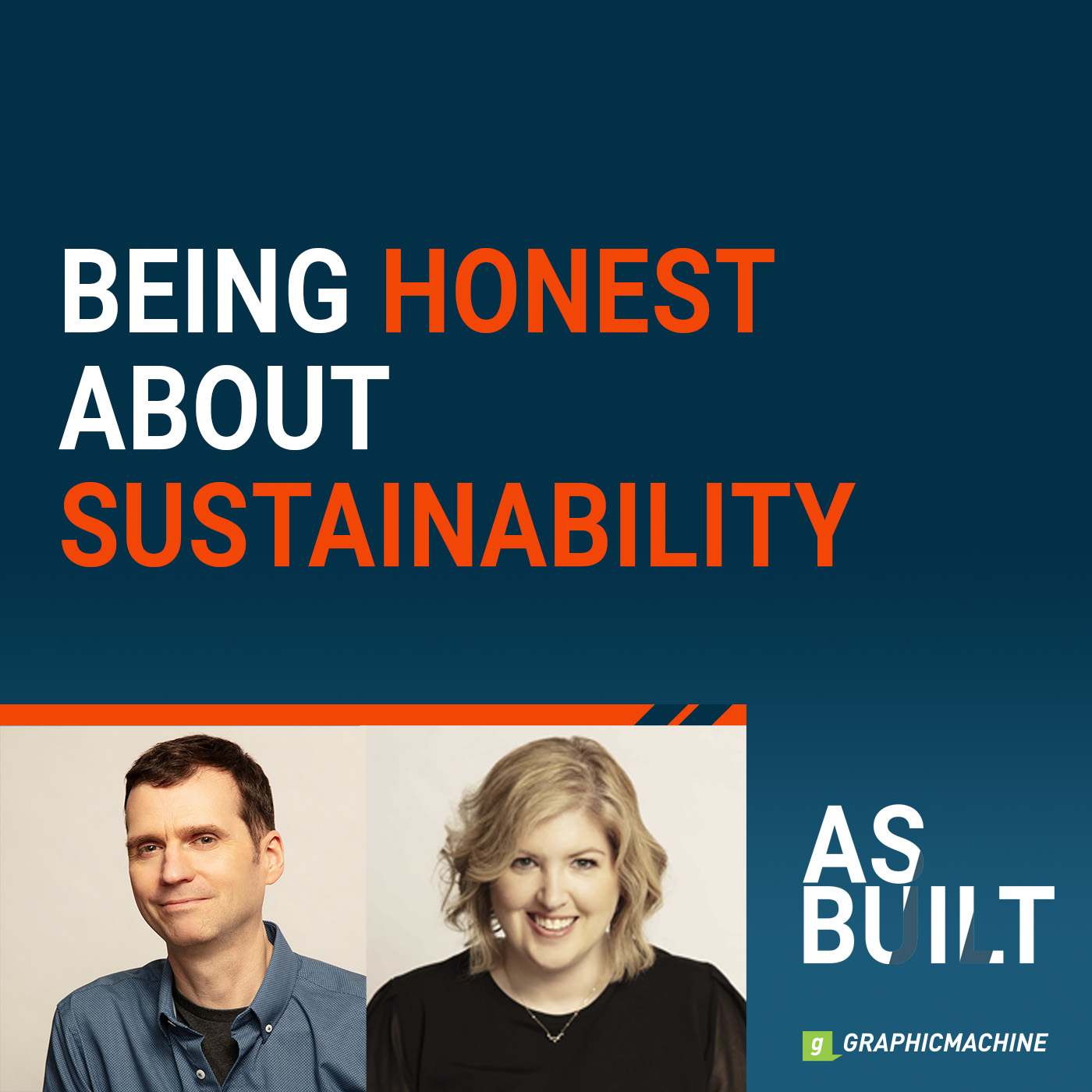
Patience Jones: Hello, and welcome to As Built, the podcast from Graphic Machine about architecture firms, buildings, and how both get built. I'm your co-host, Patience Jones. With me is...
Brian Jones: Brian Jones.
Patience Jones: Your other co-host. Thank you for joining us. Today, we are talking about being honest about sustainability. There are lots of buzz words that mean all kinds of things related to sustainability. Something is “green,” something is “environmentally friendly,” “eco-neutral.”
Brian Jones: “Recyclable.”
Patience Jones: “Recyclable.” And they can mean or not mean any number of things, because currently, there is no legal, universal definition for what these things mean. So certifications from places like LEED and the WELL Institute, those are probably the closest that anybody has come to standardized meanings for these things. What that means is lots of people can slap the green label, the environmentally friendly, the sustainable label on something, and what that means to the person using the label and what it means to the person seeing the label can be very, very, very different things.
Brian Jones: I think you run into this in food with “natural.”
Patience Jones: That's a good analogy.
Brian Jones: What that means to people is wildly different depending on your worldview. So yeah. I think this is definitely an area filled with lots of gray, ironically, for a green-oriented thing.
Patience Jones: "Natural” is a great example, because “natural”... I mean, arsenic is naturally occurring, but if you had it in food, people would be probably really upset. So-
Brian Jones: Or not.
Patience Jones: Maybe not, depending on your use case. I don't know. I think it's about what the person reading it assumes is meant by the term. So the best way to avoid any kind of unpleasant misunderstandings is to be very clear about what you mean. Don't say something's “green.” Don't say it's “sustainable” without explaining, "This is what we mean by sustainable."
Brian Jones: I think this gets into a larger thing about communicating who you really are as a firm, or as a material, is, you show your work, meaning that you show the details of how you arrived at that conclusion. Maybe the label is really the afterthought, and everything leading up to it is communicating that idea in a really clear and cohesive way.
Patience Jones: And no product or process, at least as of the recording of this podcast, is going to be 100% fantastic for the environment, because it's just not how building things works. It's not like somebody's going to say, "Your product, you said it was sustainable, and I assumed that meant that it generates electricity, and now it doesn't." Just be honest. If it's that the raw materials are made new, but those materials can be recycled with little cost in the reclaiming and processing, then say that. People would rather know exactly what they're getting and putting their money in than feel like they're being what we call “greenwashed.”
Brian Jones: I think that kind of highlights something, and I want to take it a little further, which is the idea of, you don't know what you're missing out on by concealing this. Somebody may look at your material, see that you say it's green, but you provide no backup for it, and move on. I think that's a really important thing to note, is that there are the people who bother to ask you, "What does this mean?" But there are just as many people who may not ask you and move on if you don't show your work.
Patience Jones: Mm-hmm - also what's technically possible, but realistically improbable.
Brian Jones: Yeah.
Patience Jones: So it may be that your material, when submerged in a particular solution for 50 years, biodegrades to an inert compound. Is that solution ever going to be made? Is there going to be a place where your material can be submerged?
Brian Jones: All kinds of things.
Patience Jones: If the standards by which you are deeming yourself to be green or sustainable will probably never come around, then I think it's a good idea to maybe take a step back from what you're actually saying. And anything that you can do for the environment is something good and to be talked about. You don't have to blanket it in really big, broad terms like, "We're sustainable and we're saving the world, one project at a time." Just say, "The way that we manufacture our materials is carbon neutral." Period.
Brian Jones: Well, it's definitely a moment where hyperbole can be your worst enemy. In an effort to sound like the best version of yourself, that can really come back and not be your friend.
Patience Jones: And it can really make clients unhappy when they maybe didn't pay attention to the super, super, super fine print, and now they want to get their building certified, and it turns out that the process or the product makes that unlikely.
Brian Jones: Yep.
Patience Jones: They will be really unhappy, and understandably. So what are the takeaways?
Brian Jones: The big takeaway is be honest, be forthright, and really show people what is possible with your process and your material in a realistic way.